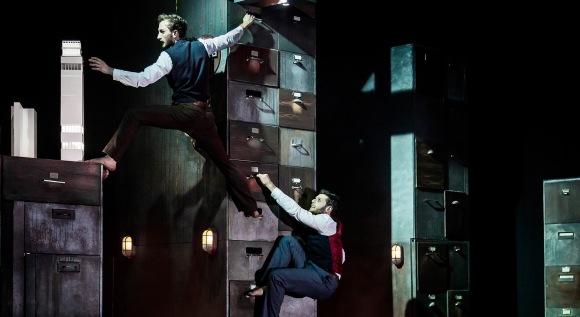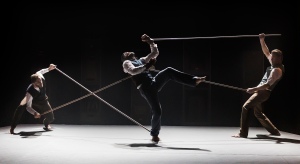The curtain rises and we are immediately impelled into a Kafkaesque world. The imposing set comprises of a ceiling height of office drawers on either side; a dull grey-brownish limbo-land that looks like the headquarters of the Stasi. The denizens of this sub-topia, Martin and Daniel, dressed like waist-coated bureaucrats from the start of the last century creep around the stage with elaborate gestures and mincing steps. This appears to be a world where cheer must be maintained and institutional routines kept to, deadlines met and clients re-assured. In short a world where anxiety must be kept at bay.
Music and wine and romance are introduced at suitable intervals. The dancing now conveys in sudden changes possible ways in which spirits can be raised or perhaps just maintained. The adaptability of the set is revealed as a drawer is pulled out, a spot-lit crimson rose waivered and a waiter emerges to supply the wants of his nervous guest. Nervous, because the lady he awaits is just a pair of surreal hands. His imagination may be playing tricks. Perhaps he has been overworking at the office where a slight mistake can be punished by extreme changes in the environment; a spotlight, loud klaxon and flashing red lights. Here is an eerie world of lost love, heartache and miscommunication where fog prevails and anyone might suddenly need a prosthetic attachment just to keep on going. Indeed, we all realise that any support mechanism keeps you dependent and, as the expressive movements so eloquently show, subject to a new fear-being manipulated by others. Gecko’s theatre shows us just how old-age, illness and impediment bring in their wake, the burdens of dependency; powerlessness against the perilous incursions of the “system”.
Although the production concerns itself with confusion and conflict, it is not possible to overlook the quality of the dance. The splendid and remarkable co-ordination, involving thoroughgoing trust between the four male dancers, is the result of intensive training. This performance quality is clearly due to hours of training. Conversations with care givers and their clients have paid dividends. The research has resulted in a work which is not only innovative but stirringly original.
The authenticity of The Institute is evidenced by the manner in which scenes are retained in the memory. These may well be different for each member of the audience. It will deeply resonate with personal emotional experience. Lyricism is evoked when hand held lights are carried floating across a darkened stage and poetry again, at the end, when a silhouetted trio of Masai warriors stand against a setting sun. The articulated pole-linked movements of the dancers rendering support to a frightened and shattered client, in search of his distant and unavailable beloved appear, uncannily like Gregor Samsa transformed into a giant spider from the pages of Franz Kafka’s Der Verwandalung. The sub-text in many parts is the how the actions of an institution results in a control mechanism colliding with flesh, like a sharp catheter being inserted into a collapsed vein. However, moments of comedy lighten and vary the pace, as when one performer has a lampshade suspended above him like an angler-fish. This is less a mechanism for predation than an ironic re-emphasis of the isolation of the individual.
Verbal communication has a particularly interesting role in Gecko’s production. Initially starting with a restrained, cramped discourse where one half-expected Ricky Gervais to make an entrance. It finished with closed-microphone expressive panting. However, it was the use of both French and German to reassure, as it were ‘the patient’ that was particularly engaging. This multilingual exchange managed to convey that words which seem to re-assure can actually disturb and distance. If this was French it was the sort of unsettling French that would be used by Ionesco. In psychiatric distress or dementia or such similar states, there is a reawakening of a child who initially is grasping to express feelings in words. Here the double-bind was clearly illustrated and gesture conveyed frustration at being manipulated. In a thought-provoking and moving production cleverly using props and Francis Bacon-like enclosures, time and life pass onward in the background. The highest accolade is that it invigorates the problematic debate about caring and manipulation which makes Gecko’s Institute both effective and relevant to contemporary social and political concerns.
Here is a video sample from Gecko entitled “Missiing Trailer”

